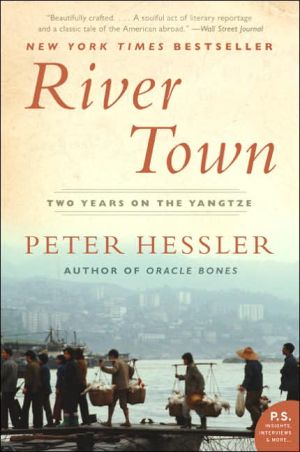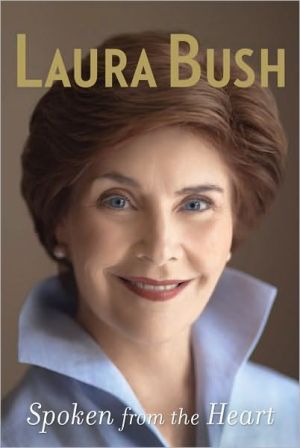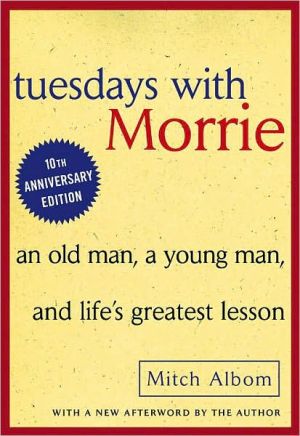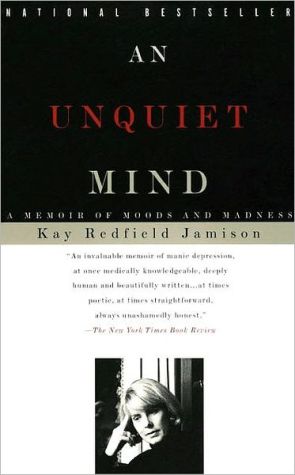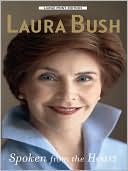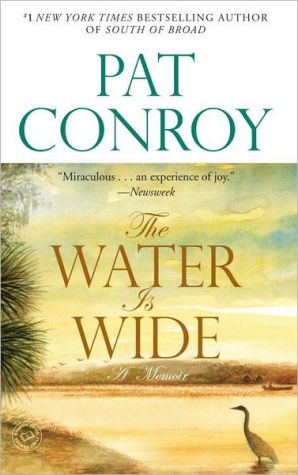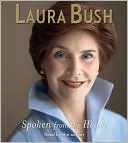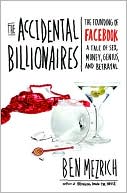River Town: Two Years on the Yangtze
A New York Times Notable Book\ Winner of the Kiriyama Book Prize\ \ In the heart of China's Sichuan province, amid the terraced hills of the Yangtze River valley, lies the remote town of Fuling. Like many other small cities in this ever-evolving country, Fuling is heading down a new path of change and growth, which came into remarkably sharp focus when Peter Hessler arrived as a Peace Corps volunteer, marking the first time in more than half a century that the city had an American resident....
Search in google:
In the heart of Chia's Sichuan province lies the small city of Fuling. Surrounded by the terraced hills of the Yangtze River valley, Fuling has long been a place of continuity, far from the bustling political centers of Beijing and Shanghai. But now Fuling is heading down a new path, and gradually, along with scores of other towns in this vast and ever-evolving country, it is becoming a place of change and vitality, tension and reform, disruption and growth. As the people of Fuling hold on to the China they know, they are also opening up and struggling to adapt to a world in which their fate is uncertain.Fuling's position at the crossroads came into remarkably sharp focus when Peter Hessler arrived as a Peace Corps volunteer in 1996, marking the first time in more than half a century that the city had an American resident. He found himself teaching English and American literature at the local college, discovering how Shakespeare and other classics look when seen through the eyes of students who have been raised in the Sichuan countryside and educated in Communist Party doctrine. His students, though, are the ones who taught him about the ways of Fuling — and about the complex process of understanding that takes place when one is immersed in a radically different society.As he learns the language and comes to know the people, Hessler begins to see that it is indeed a unique moment for Fuling. In its past is Communist China's troubled history — the struggles of land reform, the decades of misguided economic policies, and the unthinkable damage of the Cultural Revolution — and in the future is the Three Gorges Dam, which upon completion will partly floodthe city and force the resettlement of more than a million people. Making his way in the city and traveling by boat and train throughout Sichuan province and beyond, Hessler offers vivid descriptions of the people he meets, from priests to prostitutes and peasants to professors, and gives voice to their views. This is both an intimate personal story of his life in Fuling and a colorful, beautifully written account of the surrounding landscape and its history. Imaginative, poignant, funny, and utterly compelling, River Town is an unforgettable portrait of a city that, much like China itself, is seeking to understand both what it was and what it someday will be. New York Times Book Review - Adam Goodheart River Town is an important work of reportage, and not just because of the peculiar historical moment it describes -- a moment when Hessler's students can speak of their sincere admiration for the Communist ideals of Chairman Mao, then go off after graduation to seek their fortune in the tumultuous prosperity of China's southern cities. It's also a window into a part of China -- the province of Sichuan -- that has rarely been explored in depth, even though, as Hessler notes, it is home to one out of every 50 people on earth.
Chapter One\ Downstream\ I came to Fuling on the slow boat downstream from Chongqing. It was a warm, clear night at the end of August in 1996-stars flickering above the Yangtze River, their light too faint to reflect off the black water. A car from the college drove us along the narrow streets that twisted up from the docks. The city rushed past, dim and strange under the stars.\ There were two of us. We had been sent to work as teachers, and both of us were young: I was twenty-seven and Adam Meier was twenty-two. We had heard almost nothing about Fuling. I knew that part of the city would be flooded by the new Three Gorges Dam, and I knew that for many years Fuling had been closed to outsiders. Other than that I had been told very little.\ No Americans had lived there for half a century. Later, I would meet older people in town who remembered some American residents in the 1940s, before the 1949 Communist Liberation, but such memories were always vague. When we arrived, there was one other foreigner, a German who was spending a semester teaching at a local high school. But we met him only once, and he left not long after we settled in. After that we were the only foreigners in town. The population was about 200,000, which made it a small city by Chinese standards.\ There was no railroad in Fuling. It had always been a poor part of Sichuan province and the roads were bad. To go anywhere you took the boat, but mostly you didn't go anywhere. For the next two years the city was my home.\ A week after we arrived, everybody in the college gathered at the front gate. A group of students and teachers hadspent the summer walking from Fuling to Yan'an, the former revolutionary base in northern Shaanxi province, and now they were returning to school.\ It was the sixtieth anniversary of the Long March, the six-thousand-mile trek that the Red Army had made during the most critical part of the civil war, when the Kuomintang was on the verge of destroying Mao Zedong's forces. Against all odds the Communists had marched to safety, over the mountains and deserts of western China, and from Yan'an they had steadily built their strength until at last their revolution carried the nation, driving the Kuomintang to Taiwan.\ All semester there were special events in the college to commemorate the anniversary of the march. The students took classes on the history of the Long March, they wrote essays about the Long March, and in December there was a Long March Singing Contest. For the Long March Singing Contest, all of the departments practiced their songs for weeks and then performed in the auditorium. Many of the songs were the same, because the musical potential of the Long March is limited, which made the judging difficult. It was also confusing because costumes were in short supply and so they were shared, like the songs. The history department would perform, resplendent in clean white shirts and red ties, and then they would go offstage and quickly give their shirts and ties to the politics department, who would get dressed, rush onstage, and sing the same song that had just been sung. By the end of the evening the shirts were stained with sweat and everybody in the audience knew all the songs. The music department won, as they always did, and English was near the back. The English department never won any of the college's contests. There aren't any English songs about the Long March.\ But the summer walk to Yan'an was not a contest, and the return of the Fuling group was by far the biggest event of the Long March season. They had walked more than a thousand miles, all of it in the brutal heat of the Chinese summer, and in the end only sixteen had made it. Thirteen were students, and two were teachers: the Chinese department's Communist Party Secretary and the math department's Assistant Political Adviser. There was also a lower-level administrator, who had burst into tears in the middle of the walk and gained a measure of local fame for his perseverance. All of the participants were men. Some of the women students had wanted to come along, but the college had decided that the Long March was not for girls.\ A week before the assembly, President Li, the head of the college, had traveled to Xi'an to meet the marching students, because at the finish of the trek they had run into trouble.\ "The students have some kind of problem," said Dean Fu Muyou, the head of the English department, when I asked him what had happened. I think they probably have no money left." And it was true-they had run out of cash, despite their sponsorship by Magnificent Sound cigarettes, the Fuling tobacco company. It struck me as a particularly appropriate way to honor the history of Chinese Communism, to march a thousand miles and end up bankrupt in Yan'an.\ But President Li had been able to bail them out, and now the entire student body of the college met in the plaza near the front gate. It was a small teachers college with an enrollment of two thousand students, and it had been opened in 1977, one of many that were founded after the 1966-1976 Cultural Revolution had destroyed much of China's education system. On the spectrum of Chinese higher education, this type of teachers college was near the bottom. Courses took three years and the degree was considered lower than a bachelor's, and nearly all of the students came from peasant homes in the countryside of Sichuan province. After graduation they returned to their hometowns, where they became teachers in rural middle schools.
\ From Barnes & NobleThe Barnes & Noble Review\ When President Kennedy conceived of the Peace Corps, he probably didn't imagine that it would give birth to a body of such poignant and powerful travel literature. Peter Hessler's River Town is a delightful addition to the pantheon of Peace Corps literature that recounts the trials and triumphs of "the toughest job you'll ever love." \ The erudite Hessler volunteered to teach English literature at a teacher's college in Fuling, China, a small city -- by Chinese standards -- of 250,000 along the Yangtze River. Fuling wasn't renowned for anything in particular, but the city's fate was soon to change as the Chinese government unrolled its highly controversial Three Gorges river dam project. Hessler beautifully depicts the rhythms and sounds of a sleepy city on the cusp of great transition. He alternates descriptions of his daily adventures in Fuling with character studies of its notable, colorful, and sometimes wacky residents. He excels in bringing Fuling to life and sharing with the reader its unique qualities and complexities.\ But it's in the classroom that Hessler finds writer's gold. His wry and warm descriptions of his students and their stories are rich and real, and make for excellent reading. The tales include Hessler's role in aiding an individualistic student's quest for government-suppressed information and advising a naïve graduate on the trappings of men and life in the big city. There are also tense sessions with Hessler's fiercely patriotic, party-line-toeing Chinese-language tutor, whose daily debates and language lessons he describes as "opium wars."\ By far the most brilliant aspect of River Town is the way in which Hessler uses his students' own words -- from their essays to retellings of the plays they put on in class -- to provide insight into the experiences of a new generation of Chinese people. His students' perspectives on communism, democracy, America, civil liberties, and the great protagonists of English literature are simultaneously earnest and priceless, and Hessler's clever use of them to enrich his own narrative is the mark of a great storyteller.\ Hessler also travels extensively throughout some of China's far-flung, lesser-known regions. His encounters on boats and trains provide another look at the issues facing China at the end of the millennium: its struggle for identity, its tense relationship with itself and other countries, and the basic human struggles of its massive population.\ While each Peace Corps experience brings with it a host of unique and compelling circumstances, Hessler's two years in Fuling coincided with several especially important moments in modern Chinese history. Among them were the death of Deng Xiaoping and Britain's transfer of Hong Kong back to Chinese control, both in 1997. These events serve as the context within which Hessler explores and explains China. By his own admission, he was only able to scratch the surface of this multifaceted, intricate, and deeply complicated country during his two years of Peace Corps service. But readers doubtless will be moved and enlightened by Hessler's stories of life in China. His thoughtful and well-written account will enrich and educate, as well as incite a yearning within readers for more information about this incredible land. (Emily Burg)\ Emily Burg is a New York-based freelancer.\ \ \ \ \ \ Adam GoodheartRiver Town is an important work of reportage, and not just because of the peculiar historical moment it describes -- a moment when Hessler's students can speak of their sincere admiration for the Communist ideals of Chairman Mao, then go off after graduation to seek their fortune in the tumultuous prosperity of China's southern cities. It's also a window into a part of China -- the province of Sichuan -- that has rarely been explored in depth, even though, as Hessler notes, it is home to one out of every 50 people on earth.\ — New York Times Book Review\ \ \ Publishers WeeklyIn China, the year 1997 was marked by two momentous events: the death of Deng Xiaoping, the country's leader for two decades, and the return of Hong Kong after a century and a half of British rule. A young American who spent two years teaching English literature in a small town on the Yangtze, Hessler observed these events through two sets of eyes: his own and those of his alter ego, Ho Wei. Hessler sees China's politics and ceremony with the detachment of a foreigner, noting how grand political events affect the lives of ordinary people. The passing of Deng, for example, provokes a handful of thoughtful and unexpected essays from Hessler's students. The departure of the British from Hong Kong sparks a conversational "Opium War" between him and his nationalist Chinese tutor. Meanwhile, Ho Wei, as Hessler is known to most of the townspeople, adopts a friendly and unsophisticated persona that allows him to learn the language and culture of his surroundings even as Hessler's Western self remains estranged. The author conceives this memoir of his time in China as the collaborative effort of his double identity. "Ho Wei," he writes, "left his notebooks on the desk of Peter Hessler, who typed everything into his computer. The notebooks were the only thing they truly shared." Yet it's clear that, for Hessler, Ho Wei is more than a literary device: to live in China, he felt compelled to subjugate his real identity to a character role. Hessler has already been assured the approval of a select audience thanks to the New Yorker's recent publication of an excerpt. (Feb.) Copyright 2000 Cahners Business Information.\ \ \ \ \ Library JournalThis moving, mesmerizing memoir recounts Hessler's two years as a Peace Corps volunteer teaching English in the city of Fuling, located in the heart of China. Before Hessler's arrival, no one in Fuling had seen a foreigner for 50 years. Hessler was rudely thrust into this forbidden land, completely isolated from the world as we know it. Armed with astute powers of observation, acute sensitivity to cultural differences, and a good command of Chinese, he explores the culture, politics, traditions, and ideas of a people completely unknown and mysterious to the Western World. Hessler also watches as the city--torn between tradition and the onslaught of modern times--reacts to the death of Deng Xiaoping, the return of Hong Kong to the mainland, and the inevitable construction of the Three Gorges Dam on its beloved, and sacred, Yangtze River. This touching memoir of an American dropped into the center of China transcends the boundaries of the travel genre and will appeal to anyone wanting to learn more about the heart and soul of the Chinese people. Highly recommended. [Previewed in Prepub Alert, LJ 10/15/00.]--Melinda Stivers Leach, Precision Editorial Svcs., Wondervu, CO Copyright 2001 Cahners Business Information.\ \ \ \ \ Kirkus ReviewsA two-year sojourn in a small city in central China yields this youthful, gracefully impressionistic portrait of a time and place from newcomer Hessler. In 1996, Hessler reported for his Peace Corps duty to Fuling, a city of some 200,000 souls astride the murky Yangtze River, which cuts through the green and terraced mountains of Sichuan Province. This account is a chronicle of the author's days in Fuling and of a brief summer interlude of travel farther afield. Hessler's writing is unselfconsciously mellow, a lazy pace that works admirably in conjuring up Fuling as a place. There is the gentle knock of the croquet ball in the morning when the court below his window comes to life. There is this river city of steps pressed against hills; there are ridgelines cut with ancient calligraphy and pictographs that disappear under water during the rainy season. There are his students—a poignant, watershed generation who delight him to no end. Big things happen while he is in China (the Three Gorges Project is in full swing and Deng Xiaoping dies), but it is the everyday stuff that is so affecting. The surprise and unpredictability of the townsfolk catch him unawares more than once, he feels the sensitivity of being a foreigner, with all eyes upon him and little cultural abrasions everywhere:"Those were our Opium Wars—quiet and meaningless battles over Chinese and American history, fueled by indirect remarks and careful innuendo." And he loves it, despite the dislocations and frustrations: even the creepy drinking bouts at banquets ("Every banquet has a leader, a sort of alcoholic alpha male") and the relentless mocking of his foreignness by strangers (for, althoughthePeaceCorps is no longer considered a running-dog outfit, foreigners are nonetheless seen as freaks) become sources of nostalgia after a while. A vivid and touching tribute to a place and its people. First serial to the New Yorker\ \
